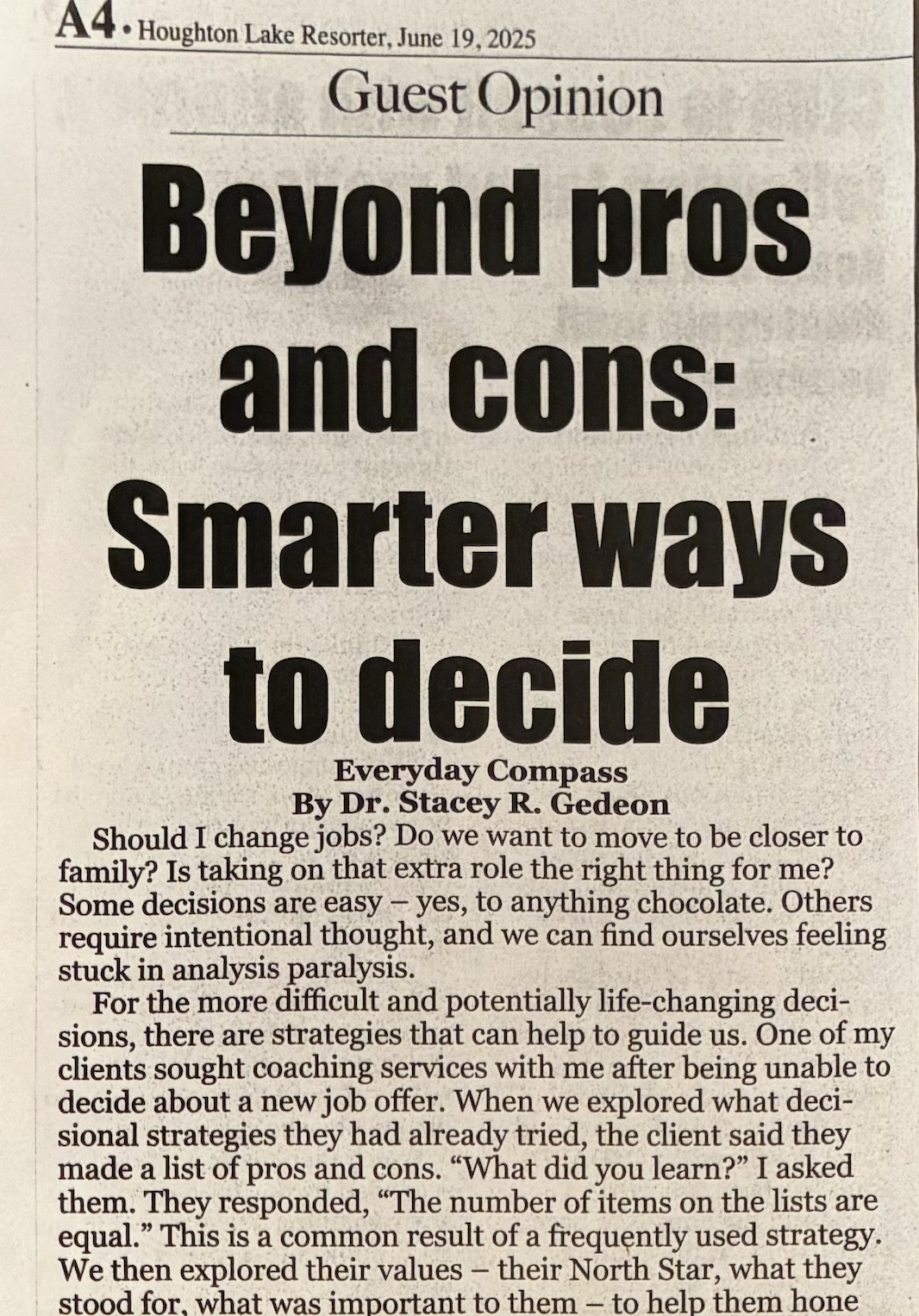Houghton Lake Resorter | Beyond Pros and Cons: Smarter Ways to Decide
Should I change jobs? Do we want to move to be closer to family? Is taking on that extra role the right thing for me? Some decisions are easy – yes, to anything chocolate. Others require intentional thought, and we can find ourselves feeling stuck in analysis paralysis.
For the more difficult and potentially life-changing decisions, there are strategies that can help to guide us. One of my clients sought coaching services with me after being unable to decide about a new job offer. When we explored what decisional strategies they had already tried, the client said they made a list of pros and cons. “What did you learn?” I asked them. They responded, “The number of items on the lists are equal.” This is a common result of a frequently used strategy. We then explored their values – their North star, what they stood for, what was important to them – to help them hone in on which job aligned best for them at this time in their life. While the new job offered more pay, it required more time away from their young family. Since the value of spending time with their family was more important than an increase in pay, they did not take the new job. Keep in mind that values can change when we are in different phases of life, so it is important to reevaluate them regularly.
A different coaching client of mine was struggling with whether to speak up at work about some unethical behaviors of a coworker they had observed. While one of their values was integrity, they were concerned about retaliation and conflict with this coworker. This is an opportunity to use some visioning exercises to guide decisions. I asked this client, “Looking back a year from now, what will you wish you would have done?” By imagining themselves in the future, they were able to see more clearly the person they want to be and the action they want to take to fulfill that vision. With this strategy, you can also extend the visioning time frame by any number of years and even at the end of life (e.g., What would you want to be said about you during your eulogy?).
Another strategy to help with making an important decision involves four questions: 1) What would be the best thing that would happen if you don’t take action? 2) What is the worst thing that would happen if you don’t take action? 3) What is the worst thing that will happen if you do take action? 4) What is the best thing that will happen if you do take action? These decisional balance questions help us to identify and explore positive and negative outcomes.
What if the struggle is about deciding what to prioritize? Enter the Eisenhower Decision Matrix! This tool can be used for everyday to-do lists, executive-level tasks, and everything in between. It consists of four quadrants in which tasks are placed: Box 1 – important/urgent, Box 2 –important/not urgent, Box 3 – not important/urgent, and Box 4 – not important/not urgent. The action you take depends upon which box the task is located: Box 1 – Do (do it now), Box 2 – Decide (schedule a time to do it), Box 3 – Delegate (who can do it for you?), and Box 4 – Delete (eliminate it). A quick internet search can provide a visual image and more details.
One final strategy is to do nothing. Yes, deciding not to make a decision is actually making a decision. This is not the same as extreme procrastination or avoidance due to fear or anxiety. Choosing to not make a decision needs to be intentional and time limited. If the situation is not an emergency and you are not sure what you want to do, do nothing. Just be sure to make a plan to address the decision in the future or much sooner if it does become urgent.
If you would like to gain more insight and clarity about an important decision you are facing, please reach out to me for more guidance!
Dr. Stacey R. Gedeon of Roscommon County is a clinical health psychologist and founder of SRG Healthcare Consulting and Professional Coaching, PLLC (srghcc.com). The content of this column is for informational purposes only and does not constitute professional advice or services in her capacity as a licensed psychologist. If you have suggestions for future topics on managing everyday challenges, please submit them to drgedeon@srghcc.com.

